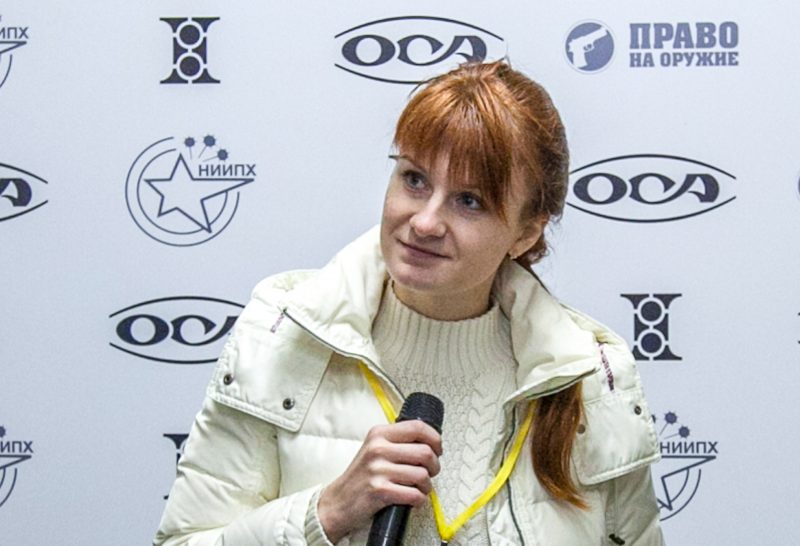Russian ‘agent’ Maria Butina faces sentencing in US
Maria Butina, leader of a Russian pro-gun organization who built a network in US Republican circles, is to be sentenced in Washington for acting illegally as an agent of a foreign government (STR)
Washington (AFP) – Alleged Russian agent Maria Butina faces sentencing in Washington Friday over her open effort to build a network of high-level Republican contacts via ties to the NRA gun lobby.
While prosecutors have asked for 18 months in prison for the 30-year-old Siberian redhead, she could be deported immediately, after already spending nine months in a US jail.
A key variable, analysts say, could be how her case is linked to Russia’s recent arrest of American former Marine Paul Whelan on spying charges.
The Justice Department alleged that although she lacks ties to Moscow’s espionage agencies, Butina was part of a broad Russian plot to infiltrate and disrupt US politics — which included meddling in the 2016 election.
But Butina argued that her five-year effort building a network with Republicans — bringing her into contact with President Donald Trump in 2015 — was no more than a private endeavor to build US-Russian friendship.
Moscow says she is the victim of a witch hunt and for months the Foreign Ministry has placed her picture at the top of its social media accounts, saying “Free Maria Butina.”
– ‘Espionage-lite’ charge –
Butina is the only Russian to have been arrested during the sprawling, nearly three-year investigation into meddling in the 2016 election.
She pleaded guilty last year to one count of conspiracy to act as an agent of a foreign government without notifying the US government — a charge US prosecutors call “espionage-lite.”
Her case appears completely unrelated to the Russian election interference that Special Counsel Robert Mueller documented in his report last week on the investigation, and none of her American contacts have been accused of anything.
The leader of a small Russian gun rights group supported by Kremlin politician Alexander Torshin, she began in 2013 to establish contacts with the National Rifle Association, one of the most powerful US political lobbies and strongly tied to the Republican Party.
Between 2014 and 2016 she and Torshin attended annual NRA conventions, where they were personally welcomed by NRA leaders.
She also attended Republican political rallies, including one for Trump, where she was chosen to ask a question about US-Russian relations.
She began a personal relationship with a Republican and NRA operative, Paul Erickson, living with him, and became a graduate student at American University in Washington.
All the while she continued efforts to get close to Republican figures.
“I’ve been involved in securing a VERY private line of communication between the Kremlin and key (Republican) leaders through, of all conduits, the (NRA),” she emailed a friend in October 2016, weeks before the presidential election.
– ‘Spot-and-assess operations’ –
Butina’s lawyer said the government had trumped up charges against her, and that she had fully cooperated with investigators.
“Maria is accused of unofficial diplomacy and lobbying at conferences,” he said.
“For all the media coverage of Hollywood style, spy-novel allegations, in reality… there are no dead drops, brush passes, secret communications devices, hidden transmitters.”
In a court filing, a former senior US counterintelligence official said Butina’s activities were part of a deliberate “spot-and-assess” intelligence operation to identifying possible recruitment targets.
Steven Hall, the CIA’s former chief of Russian operations, said her operating out in the open was simply an innovative tactic in Russian President Vladimir Putin’s “broader hybrid-warfare influence operation.”
“She’s part of the Kremlin’s plan to try to weaken the United States and the West,” he said.
– Whelan case –
It is unclear whether the resolution of Butina’s case will impact Whelan’s.
The corporate security official was arrested by Russia’s FSB security service in Moscow in late December, where he had traveled for a wedding.
He was accused of espionage after he accepted a USB drive allegedly containing state secrets from a Russian friend.
Like Butina, his behavior did not suggest a trained intelligence operative, experts say.
Whelan’s brother David doesn’t believe the two cases are related, but Hall said Washington “has to take into account that they do have an American over there, and we have a Russian here.”
“So is there not a deal to be had?” he said.
Disclaimer: Validity of the above story is for 7 Days from original date of publishing. Source: AFP.


